Importance of Communicating Effectively in Healthcare Settings
VerifiedAdded on 2023/03/23
|8
|2218
|53
AI Summary
This report highlights the importance of communicating effectively within the healthcare setting for any Registered Nurses. It also explains the three effective verbal communication strategies that Registered Nurses can use for supporting safe and caring nursing practices.
Contribute Materials
Your contribution can guide someone’s learning journey. Share your
documents today.
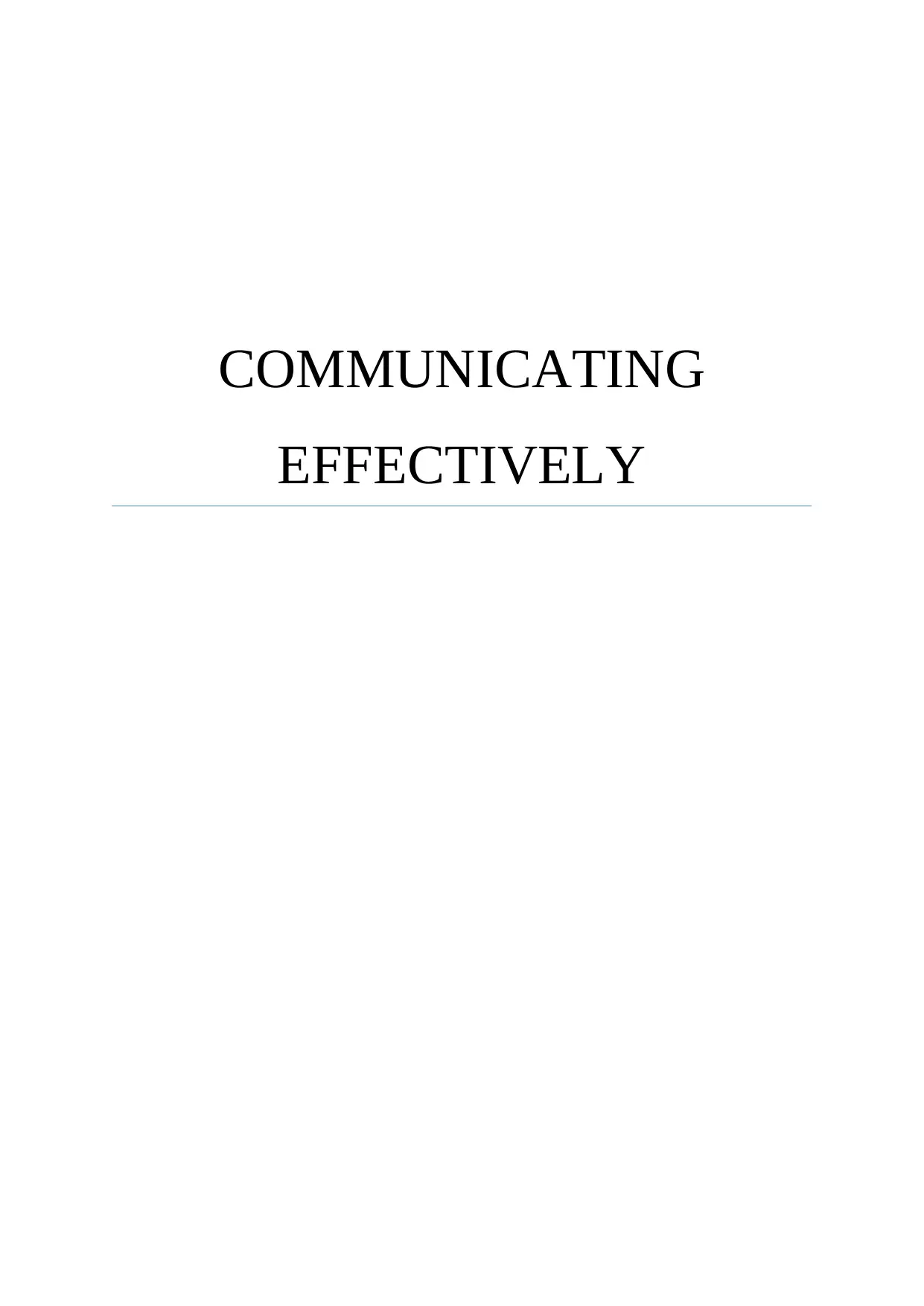
COMMUNICATING
EFFECTIVELY
EFFECTIVELY
Secure Best Marks with AI Grader
Need help grading? Try our AI Grader for instant feedback on your assignments.
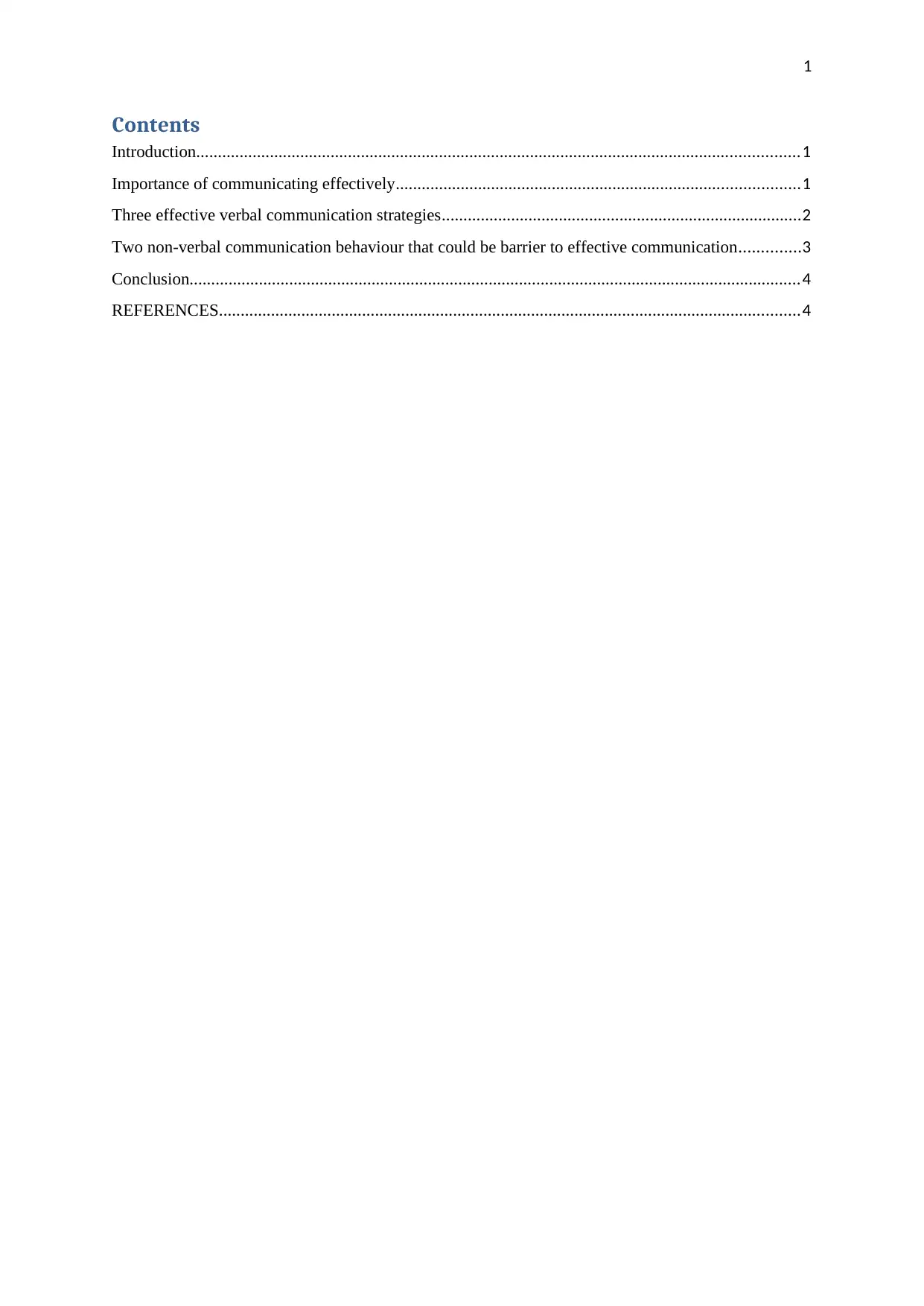
1
Contents
Introduction...........................................................................................................................................1
Importance of communicating effectively.............................................................................................1
Three effective verbal communication strategies...................................................................................2
Two non-verbal communication behaviour that could be barrier to effective communication..............3
Conclusion.............................................................................................................................................4
REFERENCES......................................................................................................................................4
Contents
Introduction...........................................................................................................................................1
Importance of communicating effectively.............................................................................................1
Three effective verbal communication strategies...................................................................................2
Two non-verbal communication behaviour that could be barrier to effective communication..............3
Conclusion.............................................................................................................................................4
REFERENCES......................................................................................................................................4
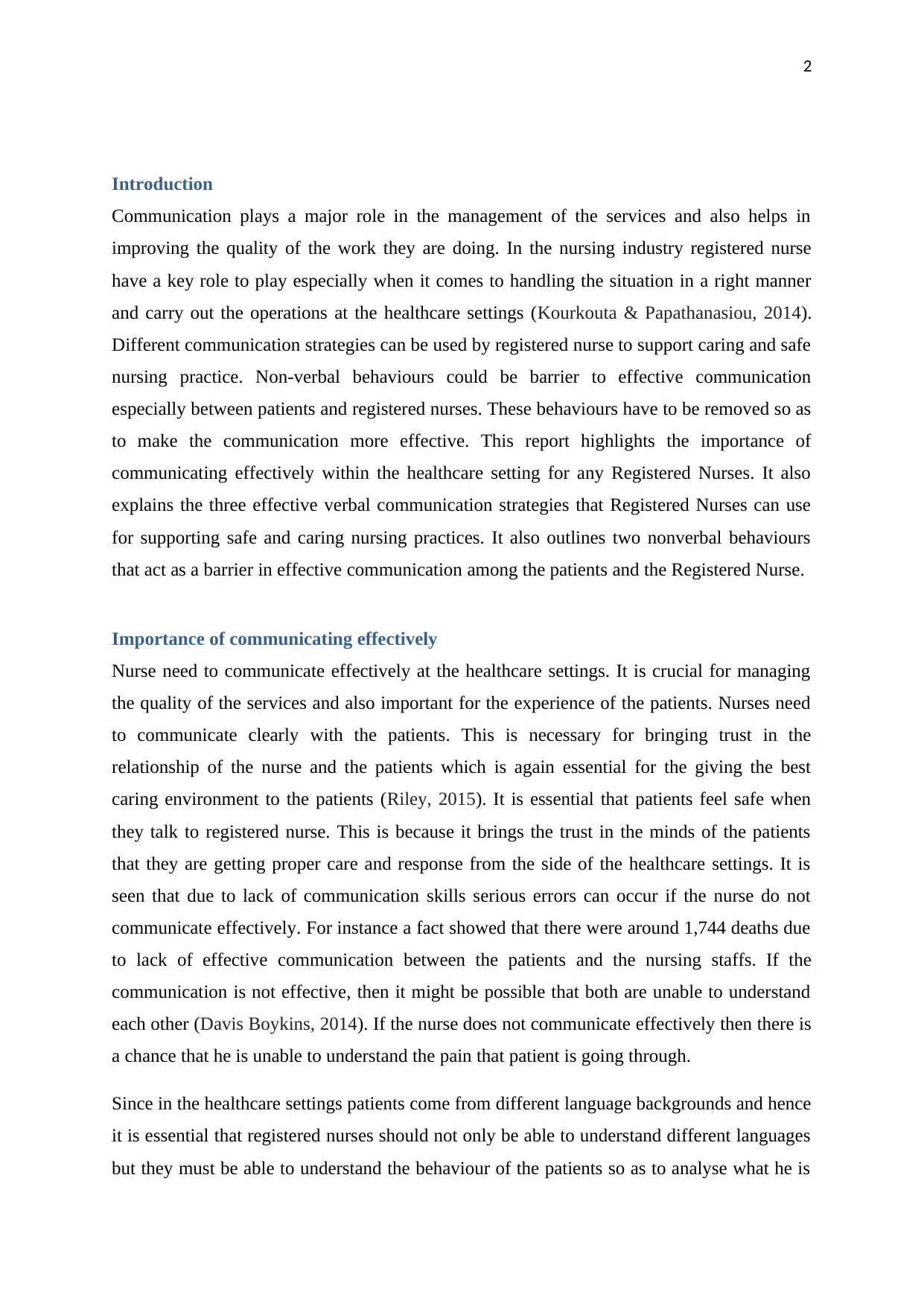
2
Introduction
Communication plays a major role in the management of the services and also helps in
improving the quality of the work they are doing. In the nursing industry registered nurse
have a key role to play especially when it comes to handling the situation in a right manner
and carry out the operations at the healthcare settings (Kourkouta & Papathanasiou, 2014).
Different communication strategies can be used by registered nurse to support caring and safe
nursing practice. Non-verbal behaviours could be barrier to effective communication
especially between patients and registered nurses. These behaviours have to be removed so as
to make the communication more effective. This report highlights the importance of
communicating effectively within the healthcare setting for any Registered Nurses. It also
explains the three effective verbal communication strategies that Registered Nurses can use
for supporting safe and caring nursing practices. It also outlines two nonverbal behaviours
that act as a barrier in effective communication among the patients and the Registered Nurse.
Importance of communicating effectively
Nurse need to communicate effectively at the healthcare settings. It is crucial for managing
the quality of the services and also important for the experience of the patients. Nurses need
to communicate clearly with the patients. This is necessary for bringing trust in the
relationship of the nurse and the patients which is again essential for the giving the best
caring environment to the patients (Riley, 2015). It is essential that patients feel safe when
they talk to registered nurse. This is because it brings the trust in the minds of the patients
that they are getting proper care and response from the side of the healthcare settings. It is
seen that due to lack of communication skills serious errors can occur if the nurse do not
communicate effectively. For instance a fact showed that there were around 1,744 deaths due
to lack of effective communication between the patients and the nursing staffs. If the
communication is not effective, then it might be possible that both are unable to understand
each other (Davis Boykins, 2014). If the nurse does not communicate effectively then there is
a chance that he is unable to understand the pain that patient is going through.
Since in the healthcare settings patients come from different language backgrounds and hence
it is essential that registered nurses should not only be able to understand different languages
but they must be able to understand the behaviour of the patients so as to analyse what he is
Introduction
Communication plays a major role in the management of the services and also helps in
improving the quality of the work they are doing. In the nursing industry registered nurse
have a key role to play especially when it comes to handling the situation in a right manner
and carry out the operations at the healthcare settings (Kourkouta & Papathanasiou, 2014).
Different communication strategies can be used by registered nurse to support caring and safe
nursing practice. Non-verbal behaviours could be barrier to effective communication
especially between patients and registered nurses. These behaviours have to be removed so as
to make the communication more effective. This report highlights the importance of
communicating effectively within the healthcare setting for any Registered Nurses. It also
explains the three effective verbal communication strategies that Registered Nurses can use
for supporting safe and caring nursing practices. It also outlines two nonverbal behaviours
that act as a barrier in effective communication among the patients and the Registered Nurse.
Importance of communicating effectively
Nurse need to communicate effectively at the healthcare settings. It is crucial for managing
the quality of the services and also important for the experience of the patients. Nurses need
to communicate clearly with the patients. This is necessary for bringing trust in the
relationship of the nurse and the patients which is again essential for the giving the best
caring environment to the patients (Riley, 2015). It is essential that patients feel safe when
they talk to registered nurse. This is because it brings the trust in the minds of the patients
that they are getting proper care and response from the side of the healthcare settings. It is
seen that due to lack of communication skills serious errors can occur if the nurse do not
communicate effectively. For instance a fact showed that there were around 1,744 deaths due
to lack of effective communication between the patients and the nursing staffs. If the
communication is not effective, then it might be possible that both are unable to understand
each other (Davis Boykins, 2014). If the nurse does not communicate effectively then there is
a chance that he is unable to understand the pain that patient is going through.
Since in the healthcare settings patients come from different language backgrounds and hence
it is essential that registered nurses should not only be able to understand different languages
but they must be able to understand the behaviour of the patients so as to analyse what he is
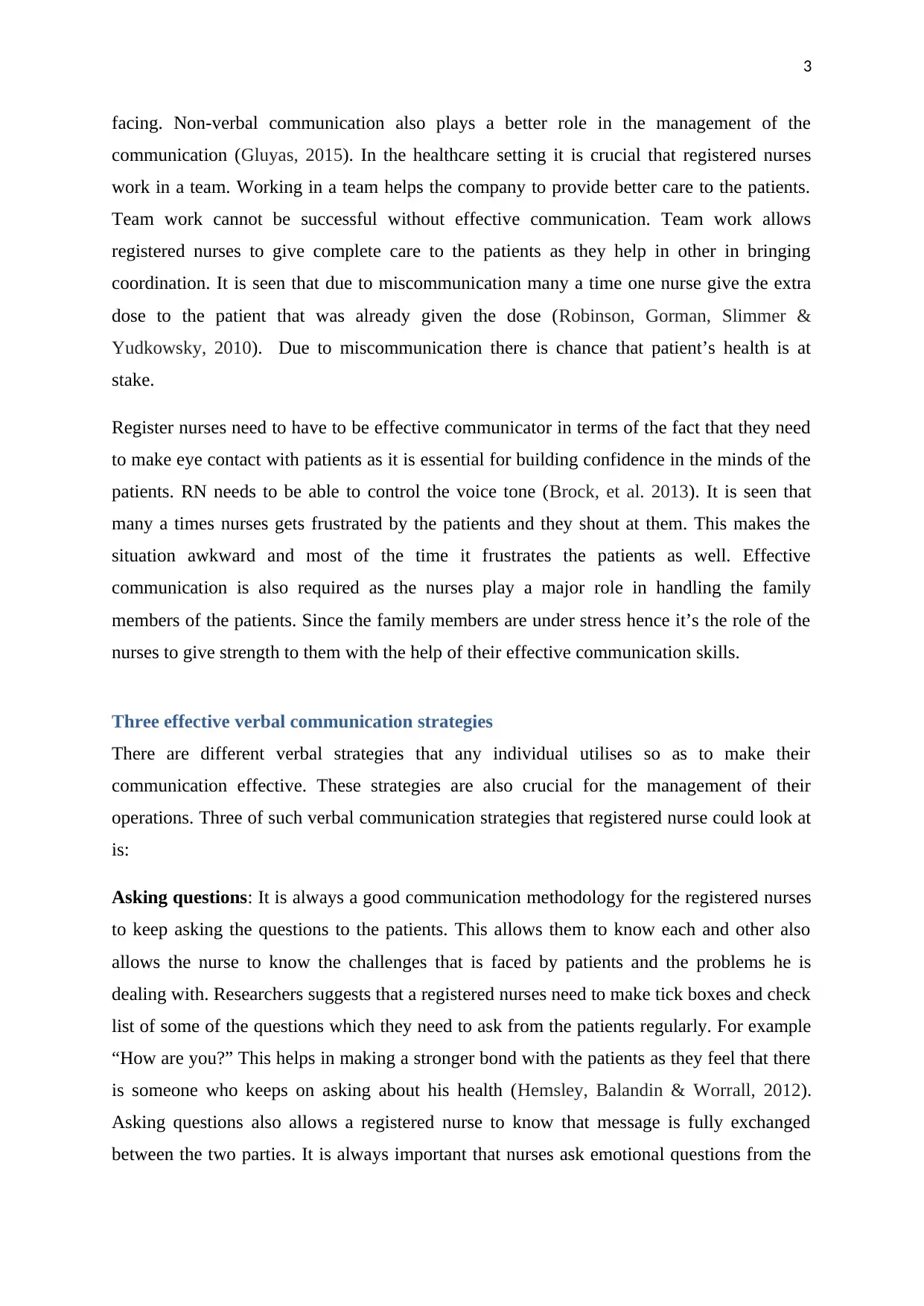
3
facing. Non-verbal communication also plays a better role in the management of the
communication (Gluyas, 2015). In the healthcare setting it is crucial that registered nurses
work in a team. Working in a team helps the company to provide better care to the patients.
Team work cannot be successful without effective communication. Team work allows
registered nurses to give complete care to the patients as they help in other in bringing
coordination. It is seen that due to miscommunication many a time one nurse give the extra
dose to the patient that was already given the dose (Robinson, Gorman, Slimmer &
Yudkowsky, 2010). Due to miscommunication there is chance that patient’s health is at
stake.
Register nurses need to have to be effective communicator in terms of the fact that they need
to make eye contact with patients as it is essential for building confidence in the minds of the
patients. RN needs to be able to control the voice tone (Brock, et al. 2013). It is seen that
many a times nurses gets frustrated by the patients and they shout at them. This makes the
situation awkward and most of the time it frustrates the patients as well. Effective
communication is also required as the nurses play a major role in handling the family
members of the patients. Since the family members are under stress hence it’s the role of the
nurses to give strength to them with the help of their effective communication skills.
Three effective verbal communication strategies
There are different verbal strategies that any individual utilises so as to make their
communication effective. These strategies are also crucial for the management of their
operations. Three of such verbal communication strategies that registered nurse could look at
is:
Asking questions: It is always a good communication methodology for the registered nurses
to keep asking the questions to the patients. This allows them to know each and other also
allows the nurse to know the challenges that is faced by patients and the problems he is
dealing with. Researchers suggests that a registered nurses need to make tick boxes and check
list of some of the questions which they need to ask from the patients regularly. For example
“How are you?” This helps in making a stronger bond with the patients as they feel that there
is someone who keeps on asking about his health (Hemsley, Balandin & Worrall, 2012).
Asking questions also allows a registered nurse to know that message is fully exchanged
between the two parties. It is always important that nurses ask emotional questions from the
facing. Non-verbal communication also plays a better role in the management of the
communication (Gluyas, 2015). In the healthcare setting it is crucial that registered nurses
work in a team. Working in a team helps the company to provide better care to the patients.
Team work cannot be successful without effective communication. Team work allows
registered nurses to give complete care to the patients as they help in other in bringing
coordination. It is seen that due to miscommunication many a time one nurse give the extra
dose to the patient that was already given the dose (Robinson, Gorman, Slimmer &
Yudkowsky, 2010). Due to miscommunication there is chance that patient’s health is at
stake.
Register nurses need to have to be effective communicator in terms of the fact that they need
to make eye contact with patients as it is essential for building confidence in the minds of the
patients. RN needs to be able to control the voice tone (Brock, et al. 2013). It is seen that
many a times nurses gets frustrated by the patients and they shout at them. This makes the
situation awkward and most of the time it frustrates the patients as well. Effective
communication is also required as the nurses play a major role in handling the family
members of the patients. Since the family members are under stress hence it’s the role of the
nurses to give strength to them with the help of their effective communication skills.
Three effective verbal communication strategies
There are different verbal strategies that any individual utilises so as to make their
communication effective. These strategies are also crucial for the management of their
operations. Three of such verbal communication strategies that registered nurse could look at
is:
Asking questions: It is always a good communication methodology for the registered nurses
to keep asking the questions to the patients. This allows them to know each and other also
allows the nurse to know the challenges that is faced by patients and the problems he is
dealing with. Researchers suggests that a registered nurses need to make tick boxes and check
list of some of the questions which they need to ask from the patients regularly. For example
“How are you?” This helps in making a stronger bond with the patients as they feel that there
is someone who keeps on asking about his health (Hemsley, Balandin & Worrall, 2012).
Asking questions also allows a registered nurse to know that message is fully exchanged
between the two parties. It is always important that nurses ask emotional questions from the
Secure Best Marks with AI Grader
Need help grading? Try our AI Grader for instant feedback on your assignments.
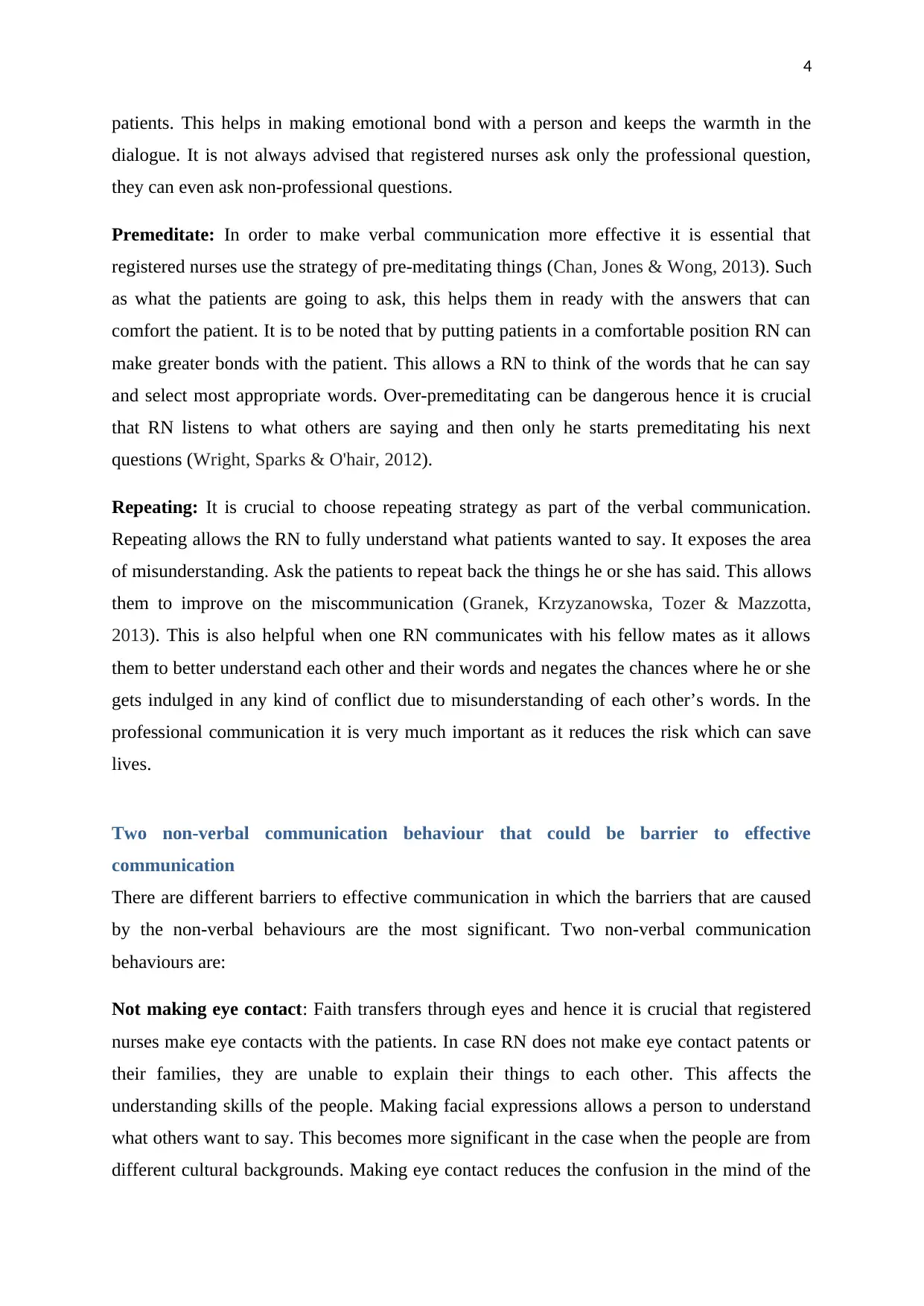
4
patients. This helps in making emotional bond with a person and keeps the warmth in the
dialogue. It is not always advised that registered nurses ask only the professional question,
they can even ask non-professional questions.
Premeditate: In order to make verbal communication more effective it is essential that
registered nurses use the strategy of pre-meditating things (Chan, Jones & Wong, 2013). Such
as what the patients are going to ask, this helps them in ready with the answers that can
comfort the patient. It is to be noted that by putting patients in a comfortable position RN can
make greater bonds with the patient. This allows a RN to think of the words that he can say
and select most appropriate words. Over-premeditating can be dangerous hence it is crucial
that RN listens to what others are saying and then only he starts premeditating his next
questions (Wright, Sparks & O'hair, 2012).
Repeating: It is crucial to choose repeating strategy as part of the verbal communication.
Repeating allows the RN to fully understand what patients wanted to say. It exposes the area
of misunderstanding. Ask the patients to repeat back the things he or she has said. This allows
them to improve on the miscommunication (Granek, Krzyzanowska, Tozer & Mazzotta,
2013). This is also helpful when one RN communicates with his fellow mates as it allows
them to better understand each other and their words and negates the chances where he or she
gets indulged in any kind of conflict due to misunderstanding of each other’s words. In the
professional communication it is very much important as it reduces the risk which can save
lives.
Two non-verbal communication behaviour that could be barrier to effective
communication
There are different barriers to effective communication in which the barriers that are caused
by the non-verbal behaviours are the most significant. Two non-verbal communication
behaviours are:
Not making eye contact: Faith transfers through eyes and hence it is crucial that registered
nurses make eye contacts with the patients. In case RN does not make eye contact patents or
their families, they are unable to explain their things to each other. This affects the
understanding skills of the people. Making facial expressions allows a person to understand
what others want to say. This becomes more significant in the case when the people are from
different cultural backgrounds. Making eye contact reduces the confusion in the mind of the
patients. This helps in making emotional bond with a person and keeps the warmth in the
dialogue. It is not always advised that registered nurses ask only the professional question,
they can even ask non-professional questions.
Premeditate: In order to make verbal communication more effective it is essential that
registered nurses use the strategy of pre-meditating things (Chan, Jones & Wong, 2013). Such
as what the patients are going to ask, this helps them in ready with the answers that can
comfort the patient. It is to be noted that by putting patients in a comfortable position RN can
make greater bonds with the patient. This allows a RN to think of the words that he can say
and select most appropriate words. Over-premeditating can be dangerous hence it is crucial
that RN listens to what others are saying and then only he starts premeditating his next
questions (Wright, Sparks & O'hair, 2012).
Repeating: It is crucial to choose repeating strategy as part of the verbal communication.
Repeating allows the RN to fully understand what patients wanted to say. It exposes the area
of misunderstanding. Ask the patients to repeat back the things he or she has said. This allows
them to improve on the miscommunication (Granek, Krzyzanowska, Tozer & Mazzotta,
2013). This is also helpful when one RN communicates with his fellow mates as it allows
them to better understand each other and their words and negates the chances where he or she
gets indulged in any kind of conflict due to misunderstanding of each other’s words. In the
professional communication it is very much important as it reduces the risk which can save
lives.
Two non-verbal communication behaviour that could be barrier to effective
communication
There are different barriers to effective communication in which the barriers that are caused
by the non-verbal behaviours are the most significant. Two non-verbal communication
behaviours are:
Not making eye contact: Faith transfers through eyes and hence it is crucial that registered
nurses make eye contacts with the patients. In case RN does not make eye contact patents or
their families, they are unable to explain their things to each other. This affects the
understanding skills of the people. Making facial expressions allows a person to understand
what others want to say. This becomes more significant in the case when the people are from
different cultural backgrounds. Making eye contact reduces the confusion in the mind of the
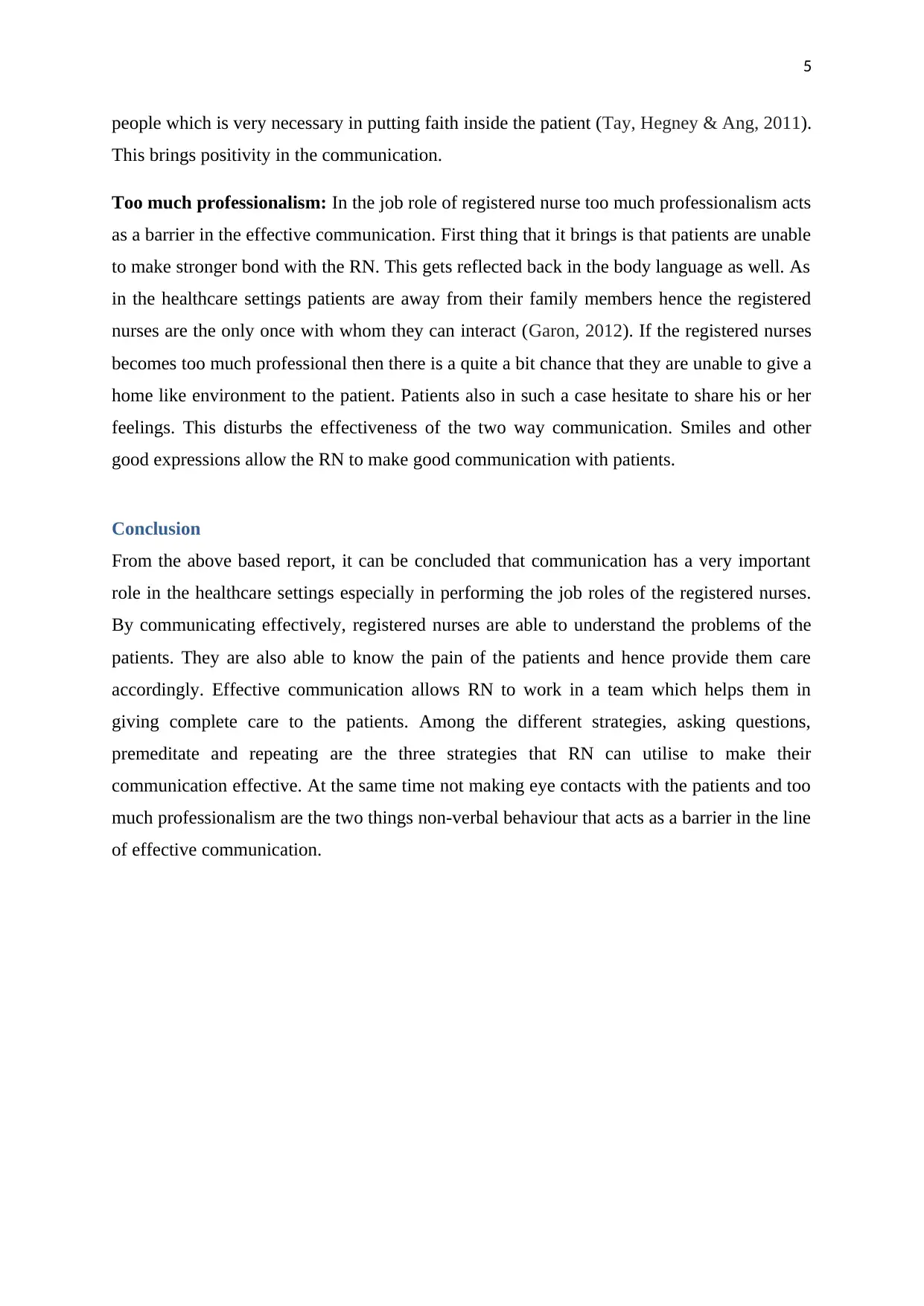
5
people which is very necessary in putting faith inside the patient (Tay, Hegney & Ang, 2011).
This brings positivity in the communication.
Too much professionalism: In the job role of registered nurse too much professionalism acts
as a barrier in the effective communication. First thing that it brings is that patients are unable
to make stronger bond with the RN. This gets reflected back in the body language as well. As
in the healthcare settings patients are away from their family members hence the registered
nurses are the only once with whom they can interact (Garon, 2012). If the registered nurses
becomes too much professional then there is a quite a bit chance that they are unable to give a
home like environment to the patient. Patients also in such a case hesitate to share his or her
feelings. This disturbs the effectiveness of the two way communication. Smiles and other
good expressions allow the RN to make good communication with patients.
Conclusion
From the above based report, it can be concluded that communication has a very important
role in the healthcare settings especially in performing the job roles of the registered nurses.
By communicating effectively, registered nurses are able to understand the problems of the
patients. They are also able to know the pain of the patients and hence provide them care
accordingly. Effective communication allows RN to work in a team which helps them in
giving complete care to the patients. Among the different strategies, asking questions,
premeditate and repeating are the three strategies that RN can utilise to make their
communication effective. At the same time not making eye contacts with the patients and too
much professionalism are the two things non-verbal behaviour that acts as a barrier in the line
of effective communication.
people which is very necessary in putting faith inside the patient (Tay, Hegney & Ang, 2011).
This brings positivity in the communication.
Too much professionalism: In the job role of registered nurse too much professionalism acts
as a barrier in the effective communication. First thing that it brings is that patients are unable
to make stronger bond with the RN. This gets reflected back in the body language as well. As
in the healthcare settings patients are away from their family members hence the registered
nurses are the only once with whom they can interact (Garon, 2012). If the registered nurses
becomes too much professional then there is a quite a bit chance that they are unable to give a
home like environment to the patient. Patients also in such a case hesitate to share his or her
feelings. This disturbs the effectiveness of the two way communication. Smiles and other
good expressions allow the RN to make good communication with patients.
Conclusion
From the above based report, it can be concluded that communication has a very important
role in the healthcare settings especially in performing the job roles of the registered nurses.
By communicating effectively, registered nurses are able to understand the problems of the
patients. They are also able to know the pain of the patients and hence provide them care
accordingly. Effective communication allows RN to work in a team which helps them in
giving complete care to the patients. Among the different strategies, asking questions,
premeditate and repeating are the three strategies that RN can utilise to make their
communication effective. At the same time not making eye contacts with the patients and too
much professionalism are the two things non-verbal behaviour that acts as a barrier in the line
of effective communication.
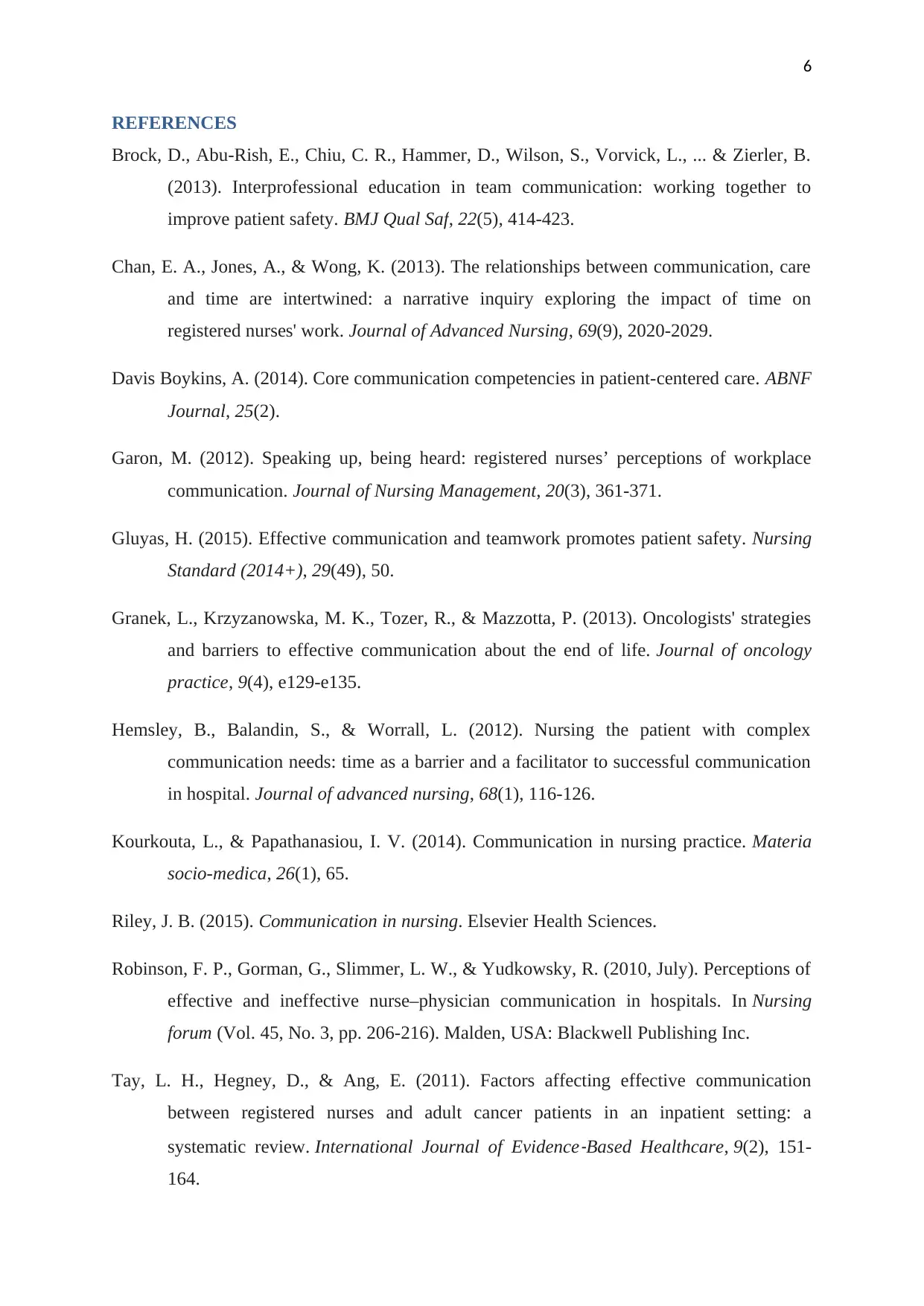
6
REFERENCES
Brock, D., Abu-Rish, E., Chiu, C. R., Hammer, D., Wilson, S., Vorvick, L., ... & Zierler, B.
(2013). Interprofessional education in team communication: working together to
improve patient safety. BMJ Qual Saf, 22(5), 414-423.
Chan, E. A., Jones, A., & Wong, K. (2013). The relationships between communication, care
and time are intertwined: a narrative inquiry exploring the impact of time on
registered nurses' work. Journal of Advanced Nursing, 69(9), 2020-2029.
Davis Boykins, A. (2014). Core communication competencies in patient-centered care. ABNF
Journal, 25(2).
Garon, M. (2012). Speaking up, being heard: registered nurses’ perceptions of workplace
communication. Journal of Nursing Management, 20(3), 361-371.
Gluyas, H. (2015). Effective communication and teamwork promotes patient safety. Nursing
Standard (2014+), 29(49), 50.
Granek, L., Krzyzanowska, M. K., Tozer, R., & Mazzotta, P. (2013). Oncologists' strategies
and barriers to effective communication about the end of life. Journal of oncology
practice, 9(4), e129-e135.
Hemsley, B., Balandin, S., & Worrall, L. (2012). Nursing the patient with complex
communication needs: time as a barrier and a facilitator to successful communication
in hospital. Journal of advanced nursing, 68(1), 116-126.
Kourkouta, L., & Papathanasiou, I. V. (2014). Communication in nursing practice. Materia
socio-medica, 26(1), 65.
Riley, J. B. (2015). Communication in nursing. Elsevier Health Sciences.
Robinson, F. P., Gorman, G., Slimmer, L. W., & Yudkowsky, R. (2010, July). Perceptions of
effective and ineffective nurse–physician communication in hospitals. In Nursing
forum (Vol. 45, No. 3, pp. 206-216). Malden, USA: Blackwell Publishing Inc.
Tay, L. H., Hegney, D., & Ang, E. (2011). Factors affecting effective communication
between registered nurses and adult cancer patients in an inpatient setting: a
systematic review. International Journal of Evidence
‐Based Healthcare, 9(2), 151-
164.
REFERENCES
Brock, D., Abu-Rish, E., Chiu, C. R., Hammer, D., Wilson, S., Vorvick, L., ... & Zierler, B.
(2013). Interprofessional education in team communication: working together to
improve patient safety. BMJ Qual Saf, 22(5), 414-423.
Chan, E. A., Jones, A., & Wong, K. (2013). The relationships between communication, care
and time are intertwined: a narrative inquiry exploring the impact of time on
registered nurses' work. Journal of Advanced Nursing, 69(9), 2020-2029.
Davis Boykins, A. (2014). Core communication competencies in patient-centered care. ABNF
Journal, 25(2).
Garon, M. (2012). Speaking up, being heard: registered nurses’ perceptions of workplace
communication. Journal of Nursing Management, 20(3), 361-371.
Gluyas, H. (2015). Effective communication and teamwork promotes patient safety. Nursing
Standard (2014+), 29(49), 50.
Granek, L., Krzyzanowska, M. K., Tozer, R., & Mazzotta, P. (2013). Oncologists' strategies
and barriers to effective communication about the end of life. Journal of oncology
practice, 9(4), e129-e135.
Hemsley, B., Balandin, S., & Worrall, L. (2012). Nursing the patient with complex
communication needs: time as a barrier and a facilitator to successful communication
in hospital. Journal of advanced nursing, 68(1), 116-126.
Kourkouta, L., & Papathanasiou, I. V. (2014). Communication in nursing practice. Materia
socio-medica, 26(1), 65.
Riley, J. B. (2015). Communication in nursing. Elsevier Health Sciences.
Robinson, F. P., Gorman, G., Slimmer, L. W., & Yudkowsky, R. (2010, July). Perceptions of
effective and ineffective nurse–physician communication in hospitals. In Nursing
forum (Vol. 45, No. 3, pp. 206-216). Malden, USA: Blackwell Publishing Inc.
Tay, L. H., Hegney, D., & Ang, E. (2011). Factors affecting effective communication
between registered nurses and adult cancer patients in an inpatient setting: a
systematic review. International Journal of Evidence
‐Based Healthcare, 9(2), 151-
164.
Paraphrase This Document
Need a fresh take? Get an instant paraphrase of this document with our AI Paraphraser
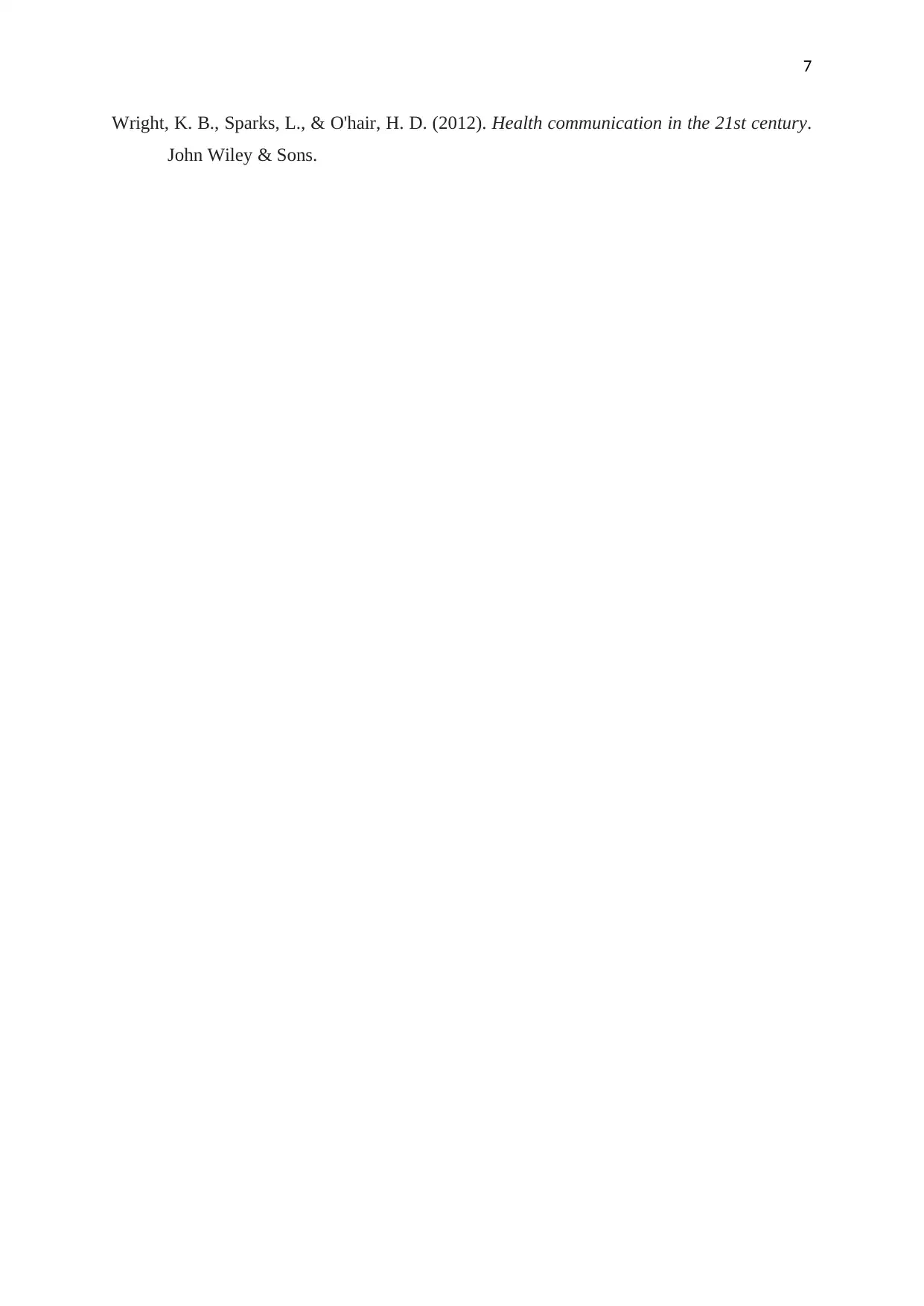
7
Wright, K. B., Sparks, L., & O'hair, H. D. (2012). Health communication in the 21st century.
John Wiley & Sons.
Wright, K. B., Sparks, L., & O'hair, H. D. (2012). Health communication in the 21st century.
John Wiley & Sons.
1 out of 8
Related Documents
Your All-in-One AI-Powered Toolkit for Academic Success.
+13062052269
info@desklib.com
Available 24*7 on WhatsApp / Email
![[object Object]](/_next/static/media/star-bottom.7253800d.svg)
Unlock your academic potential
© 2024 | Zucol Services PVT LTD | All rights reserved.





